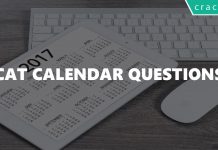Important Questions of Syllogisms for MAH-CET
Here you can download a free Syllogisms questions PDF with answers for MAH MBA CET 2022 by Cracku. These are some tricky questions in the MAH MBA CET 2022 exam that you need to find the Syllogisms of answers for the given questions. These questions will help you to make practice and solve the Syllogisms questions in the MAH MBA CET exam. Utilize this best PDF practice set which is included answers in detail. Click on the below link to download the Syllogisms MCQ PDF for MBA-CET 2022 for free.
Download Important Questions of Syllogisms for MAH-CET
Enroll to MAH-CET 2022 Crash Course
Instructions
In each of following questions have the respective statements and related conclusions .you have to take given statement is as correct and answer the following questions
Question 1: statements
Some fish are crocodiles
Some crocodiles are snakes
No snake is tortoise
All tortoises are frogs
Conclusions:
No snake is frog
Some snakes are fish
Some fish are frogs
a) None follows
b) Only I and II follow
c) only II and III follow
d) only I and III follw
e) None of these
1) Answer (A)
Solution:
The venn diagram for above statements is :
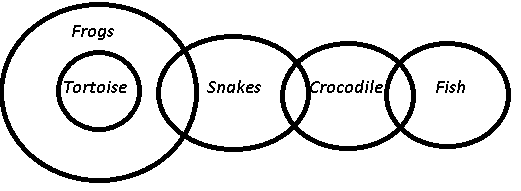
Conclusions:
No snake is frog = false
Some snakes are fish = false
Some fish are frogs = false
Thus, none follows.
=> Ans – (A)
Question 2: statements :
All bottes are jars
Some jars are pots
All pots are taps
No tap is tank
Conclusions:
I. No pot is tank
II. Some jars are pots
III. Some bottles are pots
a) only I and III follow
b) only I and II follows
c) only II and III Follows
d) None of these
e) ALL follows
2) Answer (B)
Solution:
The venn diagram for above statements is :
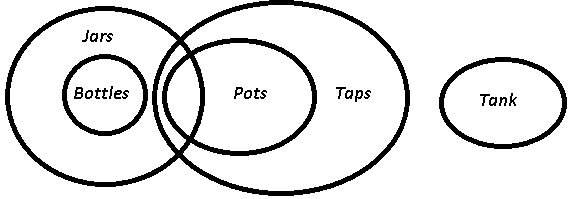
Conclusions:
I. No pot is tank = true
II. Some jars are pots = true
III. Some bottles are pots = false
Thus, only I and II follows.
=> Ans – (B)
Question 3: statements
Some windows are doors
All doors are walls
No wall is a roof
All roofs are shelters
Conclusions:
Some windows are walls
No wall is shelter
No door is shelter
a) None follows
b) only II and III follows
c) only I and III follows
d) only I follows
e) None of these
3) Answer (D)
Solution:
The venn diagram for above statements is :

Conclusions:
Some windows are walls = true
No wall is shelter = may be true
No door is shelter = may be true
Thus, only I follows.
=> Ans – (D)
Question 4: statements:
Some keys are locks
Some locks are numbers
All numbers are letters
All letters are words
Conclusions:
Some locks are letters
Some words are numbers
All numbers are words
a) only I and II follow
b) only II and III Follow
c) only I and III follow
d) only I either II or III follow
e) all follows
4) Answer (E)
Solution:
The venn diagram for above statements is :

Conclusions:
Some locks are letters = true
Some words are numbers = true
All numbers are words = true
Thus, all follows.
=> Ans – (E)
Question 5: statements:
All chillies are garlics
Some garlics are onions
All onion are potatoes
No potato is ginger
Conclusions:
No onion is ginger
Some garlic are potatoes
Some chillies are potatoes
a) only I follows
b) only II follows
c) only I and II follows
d) only I and III follows
e) all follows
5) Answer (C)
Solution:
The venn diagram for above statements is :

Conclusions:
No onion is ginger = true
Some garlic are potatoes = true
Some chillies are potatoes = false
Thus, only I and II follows.
=> Ans – (C)
Take Free MAH-CET mock tests here
Enroll to 5 MAH CET Latest Mocks For Just Rs. 299
Instructions
In each question below are three statements followed by two conclusions numbered I and II. You have to take the given statements to be true even if they seem to be at variance from
commonly known facts and then decide which of the given conclusions logically follows from the given statements disregarding commonly known facts.
a: if only Conclusion I follows.
b: if only Conclusion II follows.
c: if either Conclusion I or II follows.
d: if neither Conclusion I or II follows.
e: if both Conclusions I and II follow.
Question 6: statemetns
All winters are summers.
Some summers are springs.
No spring is an autumn.
Conclusions
I. All summers can never be autumn.
II. At least some summers are winters.
a) if only Conclusion I follows.
b) if only Conclusion II follows.
c) if either Conclusion I or II follows.
d) if neither Conclusion I or II follows.
e) if both Conclusions I and II follow.
6) Answer (E)
Solution:
from the above given statements we can draw the following venn diagram
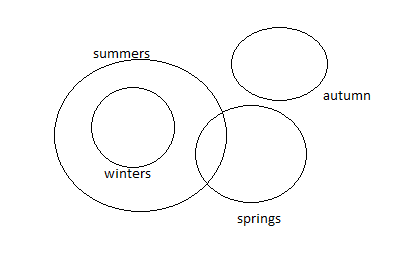
and hence both conclusion are true .
Question 7: statements
all winters are summers
Some summers are springs.
No spring is an autumn.
Conclusions
I. At least some winters are summers.
II. Some autumns being summers is a possibility.
a) if only Conclusion I follows.
b) if only Conclusion II follows.
c) if either Conclusion I or II follows.
d) if neither Conclusion I or II follows.
e) if both Conclusions I and II follow.
7) Answer (E)
Solution:
From the above given statements the following venn diagram can be drawn
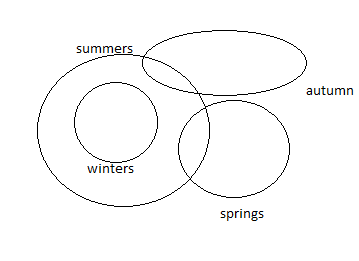
and from this venn both the conclusion can be concluded .
Question 8: Statements
All railways are trains.
No train is station.
Some stations are platforms.
Conclusions
I. All railways being platforms is a possibility.
II. No railway is station.
a) if only Conclusion I follows.
b) if only Conclusion II follows.
c) if either Conclusion I or II follows.
d) if neither Conclusion I or II follows.
e) if both Conclusions I and II follow.
8) Answer (B)
Solution:
from the above given statements the following venn diagram can be drawn
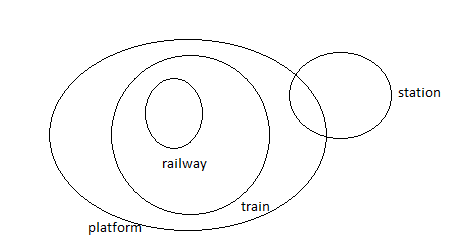
and hence the conclusion II can be drawn .
Question 9: Statements
All erasers are sharpeners.
All sharpeners are pencils.
Some pencils are pens
Conclusions
I. No eraser is a pen.
II. All pencils are sharpeners.
a) if only Conclusion I follows.
b) if only Conclusion II follows.
c) if either Conclusion I or II follows.
d) if neither Conclusion I or II follows.
e) if both Conclusions I and II follow.
9) Answer (D)
Solution:
following venn can be drawn from the above statements
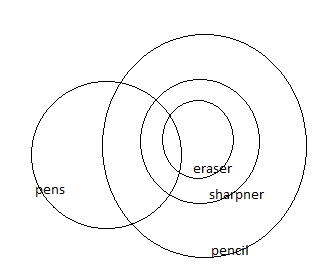
and hence none of the conclusion is true
Instructions
In each of the questions below are given three statements followed by three Conclusions numbered I, II and III. You have to take the given statements to be true even if they seem to be at variance from commonly known facts. Read all the Conclusions and then decide which of the given Conclusions logically follows from the given statements disregarding commonly known facts.
Question 10: Statements
Some saints are balls.
All balls are bats.
Some tigers are balls.
Conclusions:
I. Some bats are tigers.
II. Some saints are bats.
III. All bats are balls.
a) Only I and III follow
b) Only II follows
c) Only I and II follow
d) Only III follows
e) None of these
10) Answer (C)
Solution:
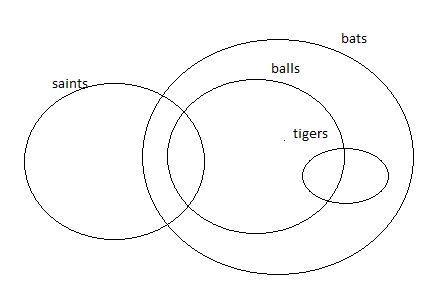
from the given statements and above figure it is on concluded that
1 – some bats are tigers
2- some saints are bats
and hence conclusion 1 and 2 are correct
Question 11: Statements :
Some cartoons are boys.
All boys are windows.
All jokers are windows.
Conclusions:
I. All jokers are boys.
II. Some cartoons are windows.
III. Some jokers are cartoons.
a) Only I follows
b) Only II follows
c) Only III follows
d) Only I and II follow
e) None of these
11) Answer (B)
Solution:
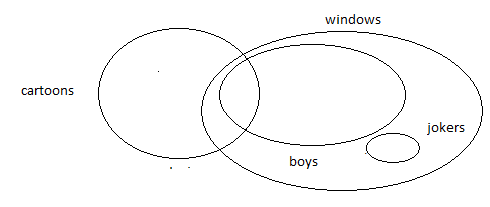
from the given statements and above figure it can be concluded that only 2nd conlcusion is true which is some cartoons are windows
Question 12: Statements :
All tables are streets.
All streets are bottles.
All parrots are bottles.
Conclusions :
I. Some streets are parrots.
II. Some bottles are tables.
III. All tables are bottles.
a) Only I follows
b) Only II follows
c) Only III follows
d) Only II and III follow
e) None of these
12) Answer (D)
Solution:
from the above statements the following venn can be drawn as a possibility
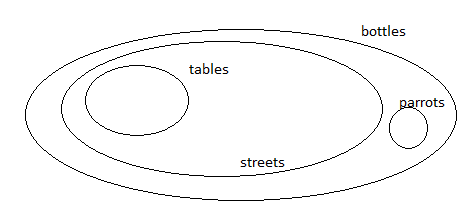
and hence we can say that only conclusion 2 and 3 are true
Question 13: Statements :
Some pigeons are dogs.
All dogs are cats.
All pigeons are horses.
Conclusions:
I. Some horses are dogs.
II. Some cats are pigeons.
III. Some horses are cats.
a) All follow
b) Only II and III follow
c) Only I and III follow
d) Only I and II follow
e) None of these
13) Answer (A)
Solution:
following venn diagram can be drawn as a possibilty
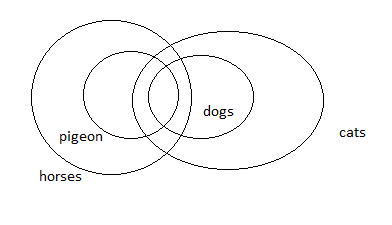
and hence we can conclude that all three conclusion are true
Question 14: Statements :
All flowers are toys.
Some toys are trees.
Some angels are trees.
Conclusions:
I. Some angels are toys.
II. Some trees are flowers.
III. Some flowers are angels.
a) Only I follows
b) Only II follows
c) Only I and III follow
d) Only III follows
e) None follows
14) Answer (E)
Solution:
The venn diagram for above statements is :
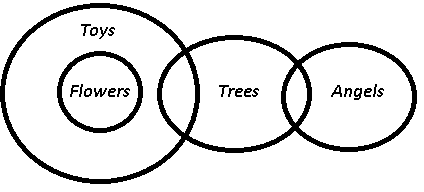
Conclusions:
I. Some angels are toys = false
II. Some trees are flowers = false
III. Some flowers are angels = false
Thus, none follows.
=> Ans – (E)
Instructions
In each question below are three statements followed by two conclusions numbered I and II. You have to take the three given statements to be true even if they seem to be at variance from commonly known facts and then decide which of the given conclusions logically follows from the three statements disregarding commonly known facts. Then decide which of the answers a, b, c, d and e. is the correct answer.
Give answer a: if only conclusion I follows.
Give answer b: if only con elusion II follows.
Give answer c: if either I or II follows.
Give answer d: if neither I nor II follows.
Give answer e: if both I and II follow.
Question 15: Statements :
All bags are boxes.
All boxes are untesils.
Some utensils are bowls.
Conclusions :
I. Some boxes are bowls.
II. All bags are utensils.
a) if only conclusion I follows.
b) if only conclusion II follows.
c) if either I or II follows.
d) if neither I nor II follows.
e) if both I and II follow.
15) Answer (B)
Solution:
following venn can be drawn from the given statements
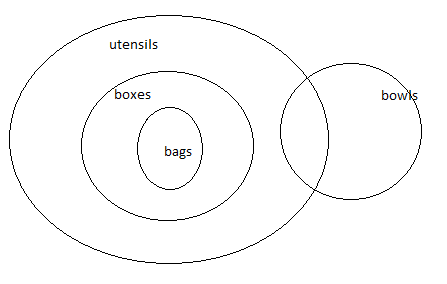
and hence we can conclude that only conclusion is true
Question 16: Statements :
Some chairs are tables.
Some tables are desks.
No desk is sofaset.
Conclusions:
I. Some chairs are sofasets.
II. No chair is sofaset.
a) if only conclusion I follows.
b) if only con elusion II follows.
c) if either I or II follows.
d) if neither I nor II follows.
e) if both I and II follow.
16) Answer (C)
Solution:
following 2 venn can be drawn from the above given statements
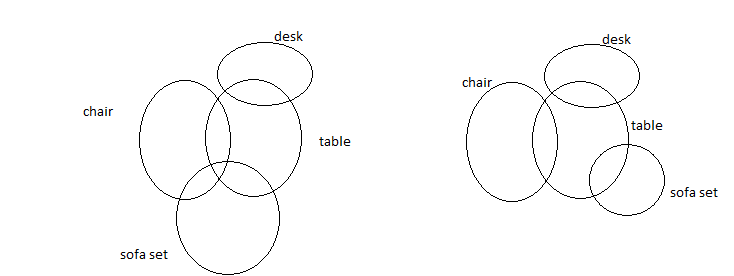
from the above two venn we can say that either of the two conclusion can be true
Question 17: Statements :
Some computers are calculators.
All calculators are keyboards.
Some keyboards are printers.
Conclusions :
I. Some computers are keyboards.
II. Some computers are printers.
a) if only conclusion I follows.
b) if only con elusion II follows.
c) if either I or II follows.
d) if neither I nor II follows.
e) if both I and II follow.
17) Answer (A)
Solution:
from the above statement we can draw the following venn diagram
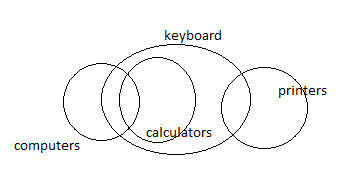
and hence from the above venn diagram we can conclude that only conclusion 1 is true
Question 18: Statements :
All plants are trees.
Some trees are leaves.
Some leaves are flowers.
Conclusions :
I. Some plants are leaves.
II. Some plants are flowers.
a) if only conclusion I follows.
b) if only con elusion II follows.
c) if either I or II follows.
d) if neither I nor II follows.
e) if both I and II follow.
18) Answer (D)
Solution:
The venn diagram for above statements is :
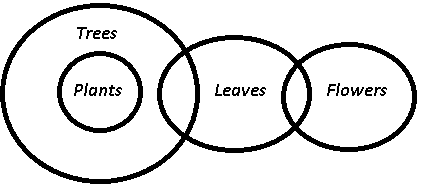
Conclusions :
I. Some plants are leaves = false
II. Some plants are flowers = false
Thus, neither I nor II follows.
=> Ans – (D)
Question 19: Statements :
Some books are stories.
All stories are fictions.
All fictions are poems.
Conclusions :
I. Some poems are books.
II. All stories are poems.
a) if only conclusion I follows.
b) if only con elusion II follows.
c) if either I or II follows.
d) if neither I nor II follows.
e) if both I and II follow.
19) Answer (E)
Solution:
following venn can be drawn from the given statements
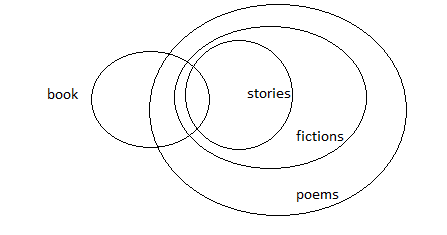
and hence we can say that both the conclusion are true
Question 20: Which of the following is definitely true if the statements given below are considered to be true ?
(You have to take the given statements to be true even if they seem to be at variance from commonly known facts and then decide which of the given conclusions logically follows from the given statements disregarding commonly known facts.)
All farms are houses.
All houses are jungles.
No jungle is a ranch.
All ranches are estates.
a) No jungle is an estate
b) No jungle is a farm
c) All estates being houses is a possibility
d) No farm is a ranch.
e) All ranches being houses is a possibility
20) Answer (D)
Solution:
Drawing a venn diagram from above information, we get :

(A) : No jungle is an estate = FALSE, it is a possibility.
(B) : No jungle is a farm = FALSE, some of the jungle is definitely farm.
(C) : All estates being houses is a possibility = FALSE, because in this case ranch will have to be a part of jungle.
(D) : No farm is a ranch. = TRUE
(E) : All ranches being houses is a possibility = FALSE, because in this case ranch will have to be a part of jungle.
=> Ans – (D)




